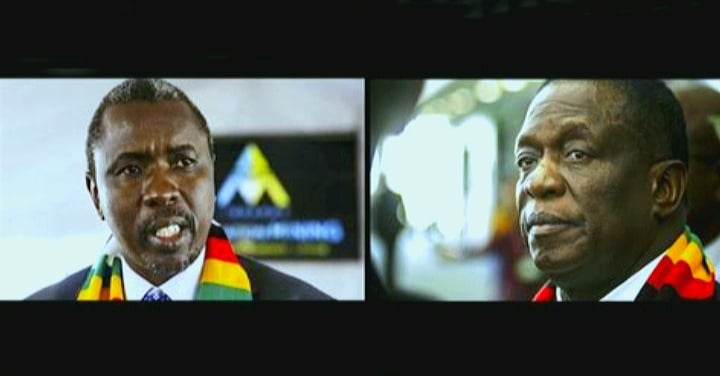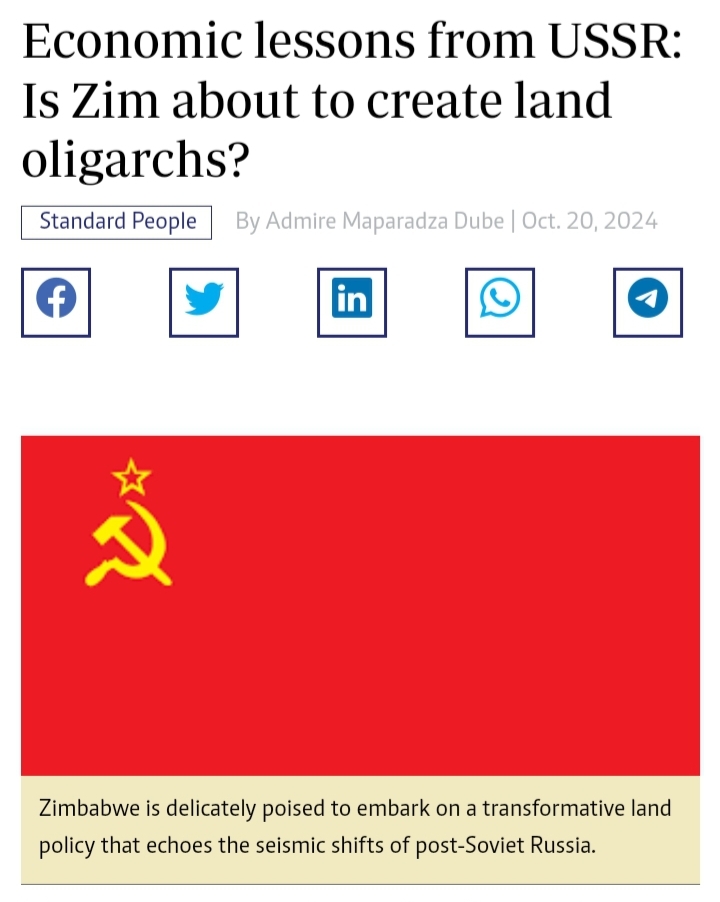
(Left) Chairperson of the Zimbabwe Land Tenure Implementation Committee (LTIC), Mr Kudakwashe Tagwirei and (Right), the president of the Republic of Zimbabwe, Dr. Emmerson Mnangagwa
The recent announcement by the Zimbabwean government regarding the issuance of title deeds to farmers, coupled with the stipulation that banks cannot seize this land as collateral, has sparked considerable debate in economic and financial circles.
This policy decision, while ostensibly aimed at empowering farmers and boosting agricultural productivity, raises significant questions about its economic viability and potential long-term consequences.
Defining Key Concepts
Before we go into the analysis, it is indispensable to establish a clear understanding of the key concepts at play so as to project success prospects of this newly minted policy:
Collateral: An asset pledged by a borrower to guarantee repayment of a debt, reducing overall risk for the lender, who has financial recourse in case the borrower defaults. The implication is that, in the event of default, the lender has the right to seize and sell the collateral to recover the loan amount. I am not a legal expert, but I would love to hear what the legal scenario is, where the borrower defaults and had used "allocated land" as "bankable collateral."
Debt Financing: refers to the process by which entities (in this case farmers) raise capital by borrowing funds, with the promise of repayment, along with interest due. It is a cornerstone of modern financial systems, enabling businesses and individuals to fund projects or operations without diluting ownership (through equity financing).
However, in the context of Zimbabwe’s new land tenure system, one must wonder: how does debt financing function when the primary asset - land - is rendered "non-seizable" by lenders? If the land cannot be repossessed in the event of default, can it truly be considered a viable basis for debt financing? Again, on this, I would be curious to hear how this policy aligns with traditional debt financing models in farming (loans, bonds, trade credit, convertible debts, commercial paper, lines of credit, etc). Particularly where banks are considered only as "administrators" doing the government's bidding.
Land Tenure: refers to the legal framework that determines how land is owned, used, and transferred. It governs who can use land resources, for how long, and under what conditions.
Zimbabwe's post-2000 land tenure system shifted from a predominantly freehold model to a state-controlled framework emphasising leases and permits. Understandably, This approach sought to redress colonial injustices, but it introduced significant economic and administrative complexities that continue to shape the country's agrarian landscape.
That a review was due is not even a question. What is, however, are the potentially funding averse implementation policies. In economic terms, secure and transferable land tenure often serves as a foundation for investment and productivity. Yet, Zimbabwe’s new system raises a critical question: if farmers hold title deeds but cannot leverage their land as collateral or face repossession risks, does this truly qualify as secure tenure? How can we help the Land Tenure Implementation Committee (LTIC) design a system that incentivises long-term investment in agricultural development, with voluntary participation of both internal and external financiers?
Property rights: are the legal and economic constructs that define ownership and determine how resources are used and exchanged. These rights are fundamental to market economies because they create incentives for innovation, investment, and trade. In theory, granting farmers title deeds should strengthen property rights.
Be that as it may, if those deeds come with restrictions - such as prohibiting banks from seizing land in case of loan defaults - can they really be classified as "full" property rights? The authorities surely know more of their intentions, which we all speculate on. Mostly good ones at that, granted.
Is it not a more proactive initiative where the public also have an outlet to return information to the top and make for an implementation approach that accommodates broader projections steeped in each's area of expertise? Because currently it feels so much like a top-down information flow model only. Command communication.
So many questions.
Theories and Application
1. Property Rights Theory
Property rights theory posits that well-defined and enforced property rights lead to increased economic efficiency. In the context of land ownership, secure property rights incentivise long-term investments in land improvement and productivity.
In the case of the Zimbabwean version of "restricted land tenure" system, it totally contradicts this theory. By limiting the full bundle of rights associated with property ownership, the policy may inadvertently reduce the land's economic value and utility. Do you actually own the land that was allocated to you? Since it has been said by the LTIC that this land is transferable (to children or to other people), what precisely is being transferred? Usage rights only? One question I have not actually heard being addressed outright is, can a farmer straight up sell this land?
2. Coase Theorem
The Coase Theorem suggests that in the absence of transaction costs, the initial allocation of property rights does not affect economic efficiency because parties can negotiate to reach an optimal outcome. However, in practice, transaction costs always exist, and the initial allocation of rights becomes critical. Zimbabwe’s "restricted land tenure" system challenges this theory by creating ambiguity around property rights and their transferability.
If farmers cannot use their land as collateral or sell it outright, how can they negotiate its value in a free market? What happens when disputes arise over land use or inheritance? Without clarity and enforceability, can farmers truly engage in meaningful negotiations to maximize the land's economic potential? These are questions that remain unanswered within this framework.
3. Institutional Economics
Institutional economics emphasises the role of institutions - rules, norms, and structures - in shaping economic behaviour and outcomes. For a land tenure system to succeed, it must align with broader institutional frameworks such as financial markets, legal systems, and governance structures.
Zimbabwe’s new tenure model seems to create institutional friction by restricting the use of land as collateral while also introducing uncertainty about ownership rights. How does this align with the banking sector’s need for secure assets to back loans? Can a farmer operating under this system confidently plan for long-term investments without fear of policy reversals or administrative interference? If the institutions supporting this system are misaligned or weak, can we realistically expect it to drive economic growth? For instance if a future administration's ministry of lands is weak and indecisive, the institutional gap may engender serious model viability of this tenure model in practice.
Financial Projections and Economic Impact
The claim that the new land tenure system will raise US$20 billion, surpassing the current national debt, warrants scrutiny. To evaluate this claim, we must consider several factors:
Current Agricultural Output: Zimbabwe's agricultural sector contributes approximately 8% annually to the country's GDP. Even with significant improvements in productivity, it is unlikely that the sector alone could generate enough value to raise US$20 billion in the short to medium term. And yes, I understand the concept of land itself holding value. But what is the intrinsic value of what you can not sell and cannot leverage for debt? Hence I looked at it from the perspective of what it can produce, which itself can then be collaterised.
Investment Requirements: Substantial investments in infrastructure, technology, and skills development would be necessary to dramatically increase agricultural productivity. Without the ability to use land as collateral with outside funders it only leaves local financiers to act in this space. In total they are seating on US$3 billion. Even if they were to loan it all out to only farmers, US$ 20 billion is some eons away. In the meantime farmers may struggle to secure the financing needed for these investments.
Market Access and Export Potential: Realising such a significant increase in value would require not only increased production but also improved market access and export capabilities. The current global economic climate and Zimbabwe's existing trade relationships may limit this potential.
Is the Zimbabwe Mercantile Exchange (ZMX) capacitated to play it's part in such an initiative that will succeed with multipronged institutional support? Is GMB going to be made redundant in terms of active buying and selling? Will it finally revert to the food security storage role and only subsiding through selling to identified parties what it has actually bought on the open market?
Infact, there are many other facets we could look into, like the timeline for achieving such a lofty aspirations in revamping the Zimbabwe agro-financial space. Sustainable agricultural development typically requires years, if not decades, of consistent policy implementation and investment.
These considerations lone ask more questions than provide answers and confirmations about the probability that the new land tenure system could be valued at US$20 billion in the near term, and by calculation, outstrip the current national internal debt.
Comparative Analysis: Lessons from the USSR
This is my second opinion piece on Zimbabwe's recent change of land tenure system and how best it can be enhanced to improve its success prospects (link is at the bottom of this article).
Drawing parallels with the Soviet Union's agricultural policies provides valuable insights. The USSR's collectivisation of agriculture and subsequent attempts at reform led to the creation of a class of land oligarchs, rather than a broad-based, productive agricultural sector. Zimbabwe's policy, while different in specifics, shares some concerning similarities:
Centralised Control: By maintaining ultimate control over land seizure, the government retains a level of centralised power reminiscent of Soviet policies, including on how funding for farming should be done and how land will be transferred. The "bankability" aspect is as defined by government.
Limited Market Mechanisms: Restricting the use of land as collateral limits the operation of free market mechanisms in the agricultural sector.
Potential for Elite Capture: Without robust checks and balances, there is a risk that the benefits of the new system could be disproportionately captured by political elites or well-connected individuals.
Recommendations
As in the first article, here too I make recommendations to address the potential pitfalls of the proposed system, and by that token, maximise national economic benefits. I recommend thus:
Gradual Implementation: Instead of a sweeping change, consider a phased approach that allows for adjustments based on observed outcomes.
Partial Collateralisation: Allow for partial use of land as collateral, balancing farmer protection with the need for credit access.
Complementary Policies: Implement policies to improve agricultural productivity, market access, and export capabilities alongside land tenure reforms.
Transparent Governance: Establish clear, transparent mechanisms for land allocation and dispute resolution to prevent elite capture and ensure equitable distribution of benefits.
Financial Sector Engagement: Work closely with the banking sector to develop alternative financing models that can support agricultural development within the new tenure system.
Complementary Institutional policy support: Strengthening the institutional framework to ensure that the land tenure system operates effectively within the broader economic and legal environment is indispensable if this new policy is to succeed. This includes assigning then enhancing the capacity of land administration authorities within the Ministries responsible for land, commerce and finance, respectively.
There will be need to improve the judicial system to handle land disputes efficiently, in the framework of his land policy iteration. Financial institutions will need to be aligned and those with specialised divisions to finance farming/agro-processing will need to be incentivised to be at the forefront and allowed to execute the unique requirements of the new tenure model.
For example, these specialised agricultural banks/divisions or credit unions could be established to provide tailored financial products that do not rely solely on traditional collateral mechanisms. Additionally, fostering collaboration between government agencies, traditional/community leaders, and private stakeholders can help create a cohesive policy environment that supports both farmers and lenders. Without robust institutional support, even the most well-intentioned reforms risk falling short of their potential.
Conclusion
The Zimbabwean government's proposed land tenure system, while aimed at empowering farmers, presents significant economic challenges. The prohibitions on policy, though understandably to correct colonial wealth misalignment, do still contradict established economic theories. This may hinder rather than help agricultural development. The projected financial gains appear overly optimistic when subjected to rigorous analysis.
As we evaluate this policy, it is crucial to remember that economic systems are complex and interconnected. A policy that appears beneficial in isolation may have unintended consequences when implemented within the broader economic context. In the case of Zimbabwe's land tenure proposal, the evidence suggests that it may not deliver the promised economic benefits, or may at least encumber other sectors on the least.
In conclusion, we are reminded of the adage: "If it does not quack like a duck, does not walk like a duck, it is NOT a duck." Similarly, freehold land tenure system that does not allow for full property rights and market-based transactions may not, by definition, be called "freehold." It actually may not necessarily function as an effective economic driver, regardless of how it is labeled or intended.
Is this duck a duck?



